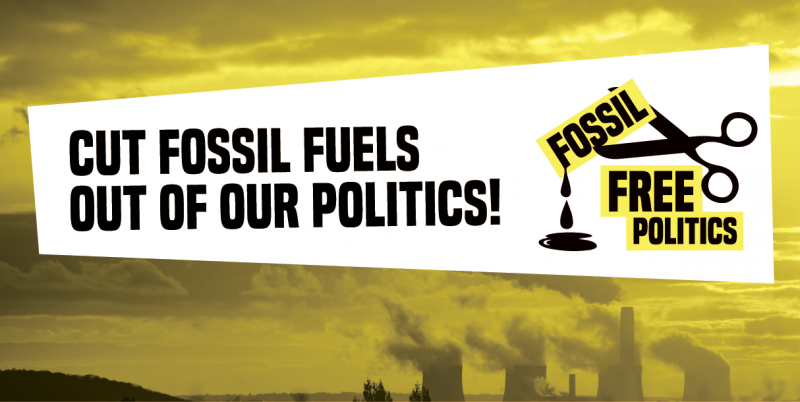
Cut gas, oil and coal out of our politics!
Almost 200 organisations worldwide unite to demand #FossilFreePolitics now
To avert climate breakdown, the vast majority of the fossil fuel industry's coal, gas and oil reserves need to stay in the ground.
For decades, fossil fuel companies and their lobbyists have denied science, and have delayed, weakened, and sabotaged climate action. They made billions in profits, while heating the planet and destroying communities.
Their business model is killing our present and our future. This stops now.
Why Fossil Free Politics?
New research by CEO, Friends of the Earth Europe, Food & Water Europe, and Greenpeace EU, reveals that since 2010, just five oil and gas corporations and their fossil fuel lobby groups have spent at least a quarter of a billion euros buying influence at the heart of European decision-making.
It’s part of a decades-long strategy by fossil fuel lobbyists of denying widely-accepted science, and trying to delay, weaken, and sabotage climate action – despite knowing their business heats the planet and destroys communities.
Since 2010, just five oil and gas corporations and their fossil fuel lobby groups have spent at least a quarter of a billion euros buying influence at the heart of European decision-making.
More than two-thirds of man-made greenhouse gas emissions come from the fossil fuel industry. To prevent global climate breakdown, the vast majority of these companies’ reserves of coal, gas and oil must stay in the ground.
The only way forward is to ensure that climate policy is made entirely in the public interest. There is a fundamental conflict between the industry’s interests and the public interest – between their core business and our need to keep global temperature rise below 1.5° C.
We need a fossil free politics before it's too late.
How?
Similar to existing restrictions on tobacco industry lobbyists, we need a firewall that protects our democratic institutions and our political decision-making from fossil fuel industry interference: no more private lobby meetings, partnerships, or collaboration.
Our political institutions must champion fossil free politics - starting with the European Parliament and European Commission.
We demand a firewall to:
1) End fossil fuel industry access to political decision-making: no lobby meetings; no seats in expert and advisory bodies; no role in public research bodies.
2) Address conflicts of interests of decision makers: no revolving door between public office and the fossil fuel industry; no industry side jobs or placements; no hiring of industry consultants.
3) End preferential treatment of the fossil fuel industry: no involvement in climate negotiations; no place on government delegations to international negotiations or trade missions; no more subsidies or incentives.
4) Reject partnerships with the fossil fuel industry: no sponsorships or partnerships; no sharing platforms with industry representatives; no hosting or attending of industry events; no party or candidate donations.
The campaign
This campaign was founded by Corporate Europe Observatory, Friends of the Earth Europe, Food & Water Europe and Greenpeace EU. We are joined by almost 200 other organisations in calling for fossil free politics.
Our campaign starts at the heart of European decision-making, in Brussels. But it doesn’t stop there.The time has come for fossil free politics at every level of decision-making: international, national, and local. We will support campaigns across EU member states to demand fossil free politics.
If your organisation wants to join the call for fossil free politics, click here.
You can also get in touch with us about the campaign here.
Useful resources
Since 2010, just five oil and gas corporations and their fossil fuel lobby groups have spent at least a quarter of a billion euros buying influence at the heart of European decision-making.
- Read our report "Big Oil and Gas Buying Influence" (October 2019)
This research is just the tip of the iceberg. Check out previous CEO reports to see how deep the influence of the fossil fuel industry goes:
- "Ending the Affair Between Politicians and Polluters" (March 2014)
- "Carte Blanche for Fracking: How the European Commission’s new advisory group is letting the shale gas industry set the agenda" (April 2015)
- "Cooking the Planet: Big Energy's year of privileged access to Europe's climate commissioners" (November 2015)
- "Carbon Welfare: How big polluters plan to profit from EU emissions trading reform" (December 2016)
- "The Great Gas Lock-in" (October 2017)
- "A Dangerous Distraction (Part II): Industry lobbies behind renewable gas" (November 2018)
- "Captured States: When EU governments are a channel for corporate interests" (February 2019)
You can also find here:
- Our press release: Big oil and gas spent over 250 million euros lobbying the EU
- Civil society Fossil Free Politics sign-on statement
